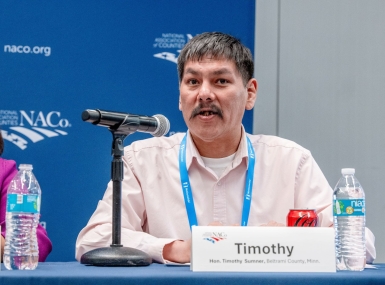Legislation to restore the state and local tax (SALT) deduction introduced in 118th Congress
Author

Paige Mellerio

Maxx Silvan
Upcoming Events
Related News

Key Takeaways
In January and February 2023, lawmakers in the 118th Congress have introduced several pieces of legislation to restore the federal state and local tax (SALT) deduction. The SALT deduction allows taxpayers to deduct state and local taxes paid from their federally taxable income, however the 2017 Tax Cuts and Jobs Act (TCJA) capped the deduction at $10,000 per year through 2025. The introduction of these bills this Congress coincides with the re-launch of the Bipartisan SALT Caucus led by Reps. Josh Gottheimer (D-N.J.), Young Kim (R-Calif.), Anna Eshoo (D-Calif.) and Andrew Garbarino (R-N.Y).
The SALT Fairness Act of 2023 (H.R. 160), led by Reps. Mike Garcia (R-Calif.) and Jimmy Panetta (D-Calif.), is bipartisan legislation that would fully repeal the $10,000 cap on the SALT deduction enacted in the TCJA. As a result, taxpayers could deduct all eligible state and local taxes they paid during the year from their federal tax return, including property taxes plus either state income or sales taxes. This bill was also sponsored and introduced by Reps. Garcia and Panetta in the 117th Congress, both of whom are members of the Bipartisan SALT Caucus.
The Tax Relief for Middle Class Families Act of 2023 (H.R. 680), introduced by Reps. Mikie Sherill (D-N.J.), Mike Lawler (R-N.Y.), Mike Levin (D-Calif.) and Eleanor Holmes Norton (D-D.C.), would increase the current cap on the SALT deduction from $10,000 (and $5,000 in the case of a married individual filing a separate return) to $100,000 (and $200,000 in the case of a joint return). If enacted, this change would become effective beginning in the 2023 tax year. Rep. Sherrill is a Vice-Chair of the Bipartisan SALT Caucus and Reps. Lawler and Holmes-Norton are members of the caucus as well. Reps. Sherrill and Lawler also introduced separate legislation that would increase the SALT cap from $10,000 to $20,000 for married couples filing a joint return (H.R. 339) and Rep. Sherrill sponsored similar pieces of legislation in the 117th Congress.
Efforts to make the SALT deduction cap permanent are also ongoing. Led by Rep. Vern Buchanan (R-Fla.), the TCJA Permanency Act (H.R. 976) would make nearly all the tax provisions of the TCJA, including the $10,000 cap on the SALT deduction, permanent. Other TCJA provisions that would be made permanent include changes to the child tax credit, small business deductions and the standard deduction. In total, 35 federal tax provisions (many of which were enacted through the TCJA) are set to expire at the end of 2025.
Counties have supported a full restoration of the SALT deduction since the establishment of the cap as part of the TCJA. The deduction protects individuals and families from double taxation and allow local governments to maintain its decision-making authority. Capping the deduction has limited state and local control of tax systems and shifted the intergovernmental balance of taxation. Restoring the full SALT deduction would improve counties’ ability to deliver essential public services, such as emergency response, infrastructure development and public health services.
NACo applauds efforts to fully restore the SALT deduction and will continue to work with congressional partners towards a long-term solution that protects local taxing authority.
Related News

County Countdown – April 7, 2025
Every other week, NACo's County Countdown reviews top federal policy advocacy items with an eye towards counties and the intergovernmental partnership. This week features a budget reconciliation update, HHS restructuring and more.

